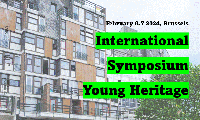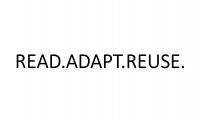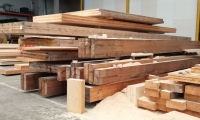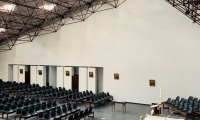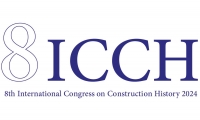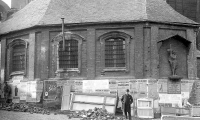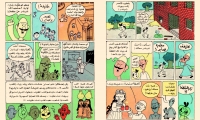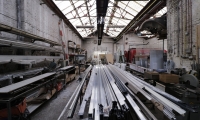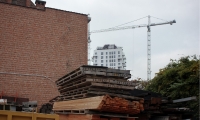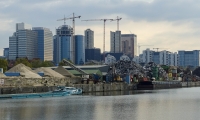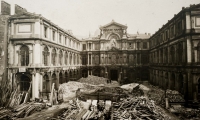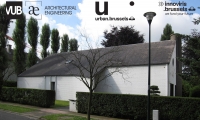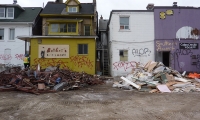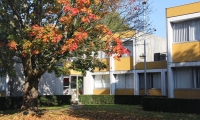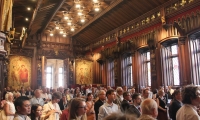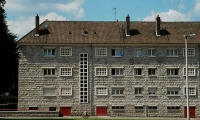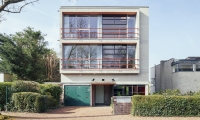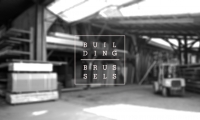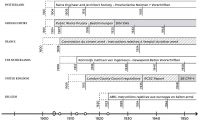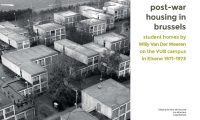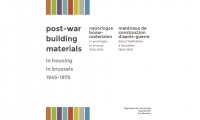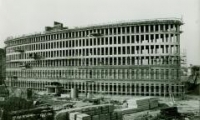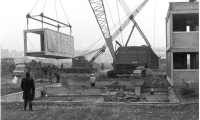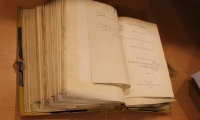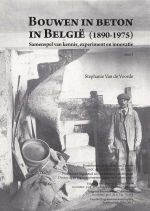Stephanie Van de Voorde
Stephanie Van de Voorde holds a Tenure Track position in Architectural and Construction History and Heritage at the Department of Architectural Engineering of the VUB. Breaking away with traditional perspectives in architectural history and heritage studies, her main research topics are related to 20th century building materials and building culture, deconstruction and reuse, as well as young heritage. She teaches architectural and construction history and the history of urban planning (Bachelor courses in Architectural Engineering) and ‘Theoretical Reflections on Architectural Heritage’ (Master course in Architectural Engineering and in Urban Studies). In addition, she is vice-president of the department of Architectural Engineering and vice-president of the Joint VUB-ULB Curriculum Council for Architectural and Civil Engineering and, as such, responsible for the master programme in Architectural Engineering.
Stephanie graduated as Master of Science in Civil Engineering: architecture in 2005 (UGent). Her PhD dealt with Building in Concrete in Belgium (1890-1975). Interplay of Knowledge, Experiment and Innovation (2011, UGent, Department of Architecture and Urban Planning and Department of Civil Engineering). Since 2013, she is affiliated to VUB Architectural Engineering conducting research on, among other things, post-war building materials in Brussels and France. Stephanie co-supervised the research by Linsy Raaffels (VUB-ARCH, Doctiris scholarship by Innoviris) and Matthijs Degraeve (VUB-HOST, IRP research project Building Brussels). She currently co-supervises PhD students Marylise Parein (VUB-ARCH and urban.brussels, Applied PhD-Innoviris), Louise Huba (VUB-ARCH, IRP research project Re-Building Brussels), Lara Reyniers (VUB-ARCH, FWO), Louis Debersaques (VUB-RC and VUB-ARCH, EOS), Chiara Kuijpers (VUB-ARCH and KU Leuven, FWO project Meaning and Material) and Femke Van der Meulen (KU Leuven and VUB-ARCH, FWO project Meaning and Material), as well as post-doctoral researchers Robby Fivez (VUB-ARCH/UGent, EOS) and Laurence Heindryckx (ULB/VUB-ARCH, EOS). Research projects she co-supervises include the Interdisciplinary Research Project 'Re-Building Brussels' (VUB), the EOS project 'Construction History, Above and Beyond' (as PI for the VUB, in collaboration with ULB and UGent), the FWO-project 'Meaning and Material' (VUB-ARCH and KU Leuven/Faculty of Architecture) and the Scientific Research Network Read.Adapt.Reuse. Stephanie was also one of the supervisors of the Living Lab-research project on the VUB student homes by Willy Van Der Meeren (Innoviris, 2017-2021). Stephanie (co-)supervised the Visiting Fellowships and scholarships of international researchers (e.g. Bill Addis, Alison Creba, Sabine Kuban, Sara Wermiel, Joana Proi, Takuya Miyake, Dalila Ghodbane).
Stephanie co-organized the Sixth International Congress on Construction History (6ICCH, Brussels, 2018) and co-edited the proceedings ‘Building Knowledge, Constructing Histories’. Stephanie is also a founding member of the International Federation for Construction history, a member of the scientific committee of 7ICCH (Lisbon) and 8ICCH (Zurich), and co-chairs the research group Construction Histories Brussels, together with Rika Devos (ULB). In relation to the field of heritage, she is an Expert Member of the ICOMOS International Scientific Committee 20th Century (ISC20C). Until 2023, she was on the editorial board of the bimonthly journal M&L. Monumenten, Landschappen en Archeologie. Stephanie is a board member of vzw Korei and of the Brussels Centre for Urban Studies. In 2023-2024, Stephanie curates the lecture series StadsSalonsUrbains, entitled 'Rewind Fast Forward. Unraveling the historical layers and meanings of our built environment'.
Supervised PhDs
-
From demolition towards preservation: a paradigm shift for building in Brussels
by
Louise Huba
-
Reviving the circular building industry. Looking into construction, demolition and reuse from the past to the future.
by
Lara Reyniers
-
The Brussels housing stock (1975-2000): materiality and heritage value
by
Marylise Parein
-
Architects' houses in Brussels. Strategies for valorization.
by
Linsy Raaffels
-
Building Brussels. Construction Entrepreneurs in a Transforming Urban Space (1830-1970)
by
Matthijs Degraeve
Projects
PhD research
Bouwen in beton in België (1890-1975). Samenspel van kennis, experiment en innovatie
Reinforced concrete, both as a building material and as a building technique, is well-rooted in the history of Belgian architecture in the twentieth century. Nevertheless, a comprehensive, in-depth study on the history of the development and application of concrete in Belgium was yet to be written. The research presented in this work is a first attempt at such a study: this thesis wants to document, analyse and interpret the history of concrete construction in Belgium over the period 1890-1975 in a differentiated and multidisciplinary manner and based on a thematic/chronologic approach. The classical architectural historical perspective, focusing mainly on architects and their designs, writings and realizations, is stirred up and altered by a focus on the interface between the history of architecture and the history of construction. Apart from architects, this study also features engineers, builders, inventors, designers, consulting agencies, prefab-companies, authorities, clients, writers and professional bodies: each of these actors has, from his proper frame of reference, yet often linked with each other, contributed to the development of reinforced concrete as a building material and as a building technique. More than focusing on the material, this study engages with these actors, their intentions, knowledge and realizations, in theory and in practice, and with the interplay between them. By tracing the circles in which these actors moved, which interactions were fostered and how these relations nourished knowledge, experience and significance, a network spanning the (diffuse) borders of various disciplines and fields of research is traced. Actors, as well as accomplishments, corporations, writings, innovations, theories or developments are put in place in this network, thus mapping out the development and implementation of (knowledge) on reinforced concrete in Belgium.
The full text of the PhD (in Dutch) can be downloaded on: https://biblio.ugent.be/publication/1213287 or requested by email.

